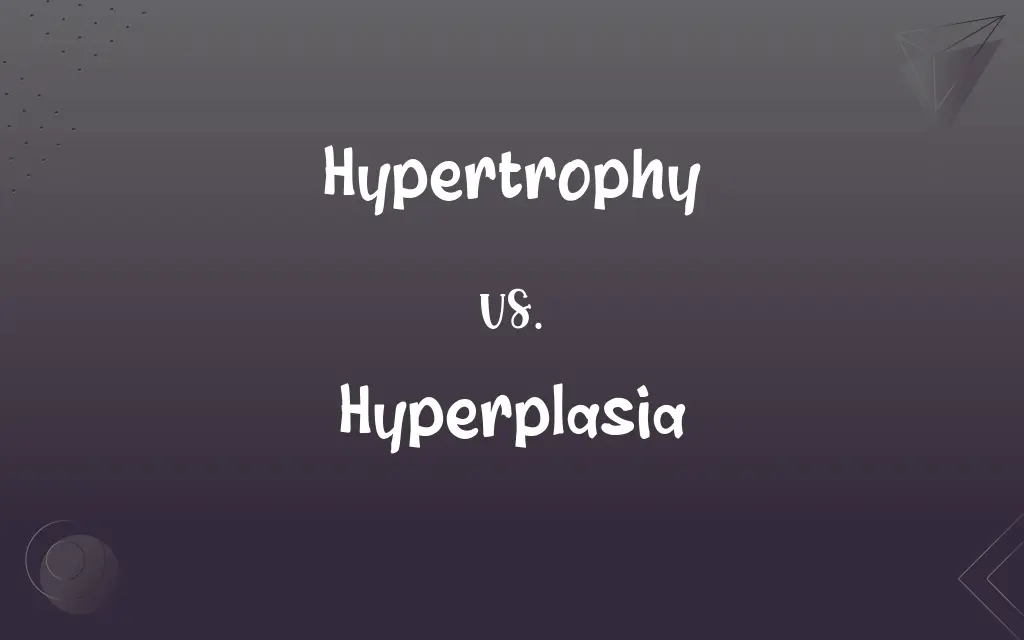Hypertrophy vs. Hyperplasia: What's the Difference?
Edited by Aimie Carlson || By Harlon Moss || Updated on October 28, 2023
Hypertrophy refers to the increase in size of existing cells, while hyperplasia denotes the increase in cell number due to cell proliferation. Both are mechanisms of tissue growth but differ in their cellular basis.

Key Differences
Hypertrophy and hyperplasia are both processes that lead to the enlargement of an organ or tissue. However, they achieve this through different cellular mechanisms. Hypertrophy involves the growth and enlargement of individual cells, resulting in a larger overall size but without an increase in cell count. Hyperplasia, on the other hand, results from an increase in the number of cells due to heightened cell division.
For instance, muscle growth from resistance training typically involves hypertrophy. When a muscle is subjected to increased load or stress, the muscle fibers, or cells, grow in size to adapt to the added demand. Contrastingly, hyperplasia is commonly seen in the context of tissue regeneration or in conditions where there's an abnormal proliferation of cells, such as in certain diseases.
A crucial difference between hypertrophy and hyperplasia is the implication on cellular DNA. In hypertrophy, there's no change in the number of DNA sets within a cell; the cell simply grows larger. In hyperplasia, however, there's an increase in the number of DNA sets due to the division and multiplication of cells.
To illustrate further, consider the human liver's ability to regenerate. If a portion of the liver is removed, the remaining cells don't just grow larger (hypertrophy). Instead, they undergo rapid cell division (hyperplasia) to restore the liver to its original size and function.
Comparison Chart
Cellular Mechanism
Increase in cell size
Increase in cell number
ADVERTISEMENT
DNA Quantity per Cell
Unchanged
Increased (due to cell division)
Common Occurrence
Muscle growth from training
Tissue regeneration, certain diseases
Resulting Tissue Change
Larger cells, same cell count
Same-sized cells, increased cell count
Inducing Factors
Mechanical overload, certain hormones
Prolonged tissue injury, chronic hormonal stimulation
Hypertrophy and Hyperplasia Definitions
Hypertrophy
Increase in tissue mass without an increase in cell number.
Resistance exercises lead to skeletal muscle hypertrophy by enlarging muscle fibers.
ADVERTISEMENT
Hyperplasia
Increase in tissue mass due to cell division.
Liver regeneration after injury is a classic case of hyperplasia.
Hypertrophy
A physiological response to increased workload or demand.
Kidney hypertrophy may occur when one kidney compensates for the other's loss.
Hyperplasia
Cellular proliferation leading to more cells.
Skin warts result from hyperplasia, where skin cells multiply excessively.
Hypertrophy
Cellular enlargement without cell division.
Cardiac hypertrophy can result from high blood pressure, causing heart cells to grow larger.
Hyperplasia
A response to a specific stimulus or injury leading to cell multiplication.
Chronic inflammation can sometimes cause hyperplasia in affected tissues.
Hypertrophy
Growth of an organ or tissue due to increased cell size.
Bodybuilders often aim for muscle hypertrophy through intensive training.
Hyperplasia
An adaptive mechanism involving increased cell count.
In response to hormonal changes, the endometrial lining can undergo hyperplasia.
Hypertrophy
Cellular growth without proliferation.
In certain diseases, glandular tissue can exhibit hypertrophy, increasing organ size without added cells.
Hyperplasia
Growth of an organ or tissue due to increased cell number.
Benign prostatic hyperplasia involves an increased number of cells in the prostate gland.
Hypertrophy
A nontumorous enlargement of an organ or a tissue as a result of an increase in the size rather than the number of constituent cells
Muscle hypertrophy.
Hyperplasia
An abnormal increase in the number of cells in a tissue or organ, with consequent enlargement of the part or organ.
Hyperplasia
(medicine) An increase in the size of a tissue or organ due to increased number of cells.
Hyperplasia
An increase in, or excessive growth of, the normal elements of any part.
Hyperplasia
Abnormal increase in number of cells
FAQs
What does hypertrophy refer to?
Hypertrophy refers to the enlargement of existing cells in a tissue or organ.
Which condition involves an increase in DNA quantity per cell?
Hyperplasia, as it involves cell division leading to more cells.
Can hyperplasia be a sign of cancer?
While not all hyperplasia is cancerous, some forms, especially if uncontrolled, can be precancerous.
Is hyperplasia always harmful?
Not always; while it can indicate diseases, it's also a natural response in certain healing processes.
Which process, hypertrophy or hyperplasia, is reversible?
Both processes can be reversible depending on the stimulus and tissue involved.
How is hyperplasia different from hypertrophy?
Hyperplasia involves an increase in cell number due to cell division, while hypertrophy is about cell enlargement.
Can hypertrophy reverse?
Yes, if the stimulus causing hypertrophy is removed, cells might return to their original size.
Which process makes the liver regenerate?
The liver regenerates primarily through hyperplasia.
Is benign prostatic hyperplasia a type of cancer?
No, despite the increased cell number, it's a benign condition.
Can hyperplasia occur in the skin?
Yes, conditions like psoriasis or warts can result from skin cell hyperplasia.
How does the heart adapt to increased workload?
The heart can undergo hypertrophy, with individual cardiac cells growing larger.
Which is more common in bodybuilding, hypertrophy or hyperplasia?
Hypertrophy is more commonly associated with bodybuilding.
Are there treatments to reverse hyperplasia?
Depending on the cause and location, treatments range from medications to surgical interventions.
Can skeletal muscles undergo hyperplasia?
While the dominant response is hypertrophy, some studies suggest minor hyperplasia might occur.
Can certain drugs induce hypertrophy?
Yes, certain drugs, especially hormones, can lead to hypertrophy in targeted tissues.
How is hypertrophy detected?
It can be detected through imaging studies, histological examinations, or observing organ function.
Can both hypertrophy and hyperplasia occur simultaneously?
Yes, some tissues can exhibit both processes simultaneously under certain conditions.
Is hypertrophy always beneficial?
Not necessarily; while it's advantageous in muscles due to exercise, it can be problematic in organs like the heart.
What might cause hyperplasia in tissues?
Chronic injuries, hormonal changes, or certain diseases can lead to hyperplasia.
Is muscle growth from exercise primarily hypertrophy or hyperplasia?
It's primarily hypertrophy, with muscle fibers increasing in size.
About Author
Written by
Harlon MossHarlon is a seasoned quality moderator and accomplished content writer for Difference Wiki. An alumnus of the prestigious University of California, he earned his degree in Computer Science. Leveraging his academic background, Harlon brings a meticulous and informed perspective to his work, ensuring content accuracy and excellence.
Edited by
Aimie CarlsonAimie Carlson, holding a master's degree in English literature, is a fervent English language enthusiast. She lends her writing talents to Difference Wiki, a prominent website that specializes in comparisons, offering readers insightful analyses that both captivate and inform.































































